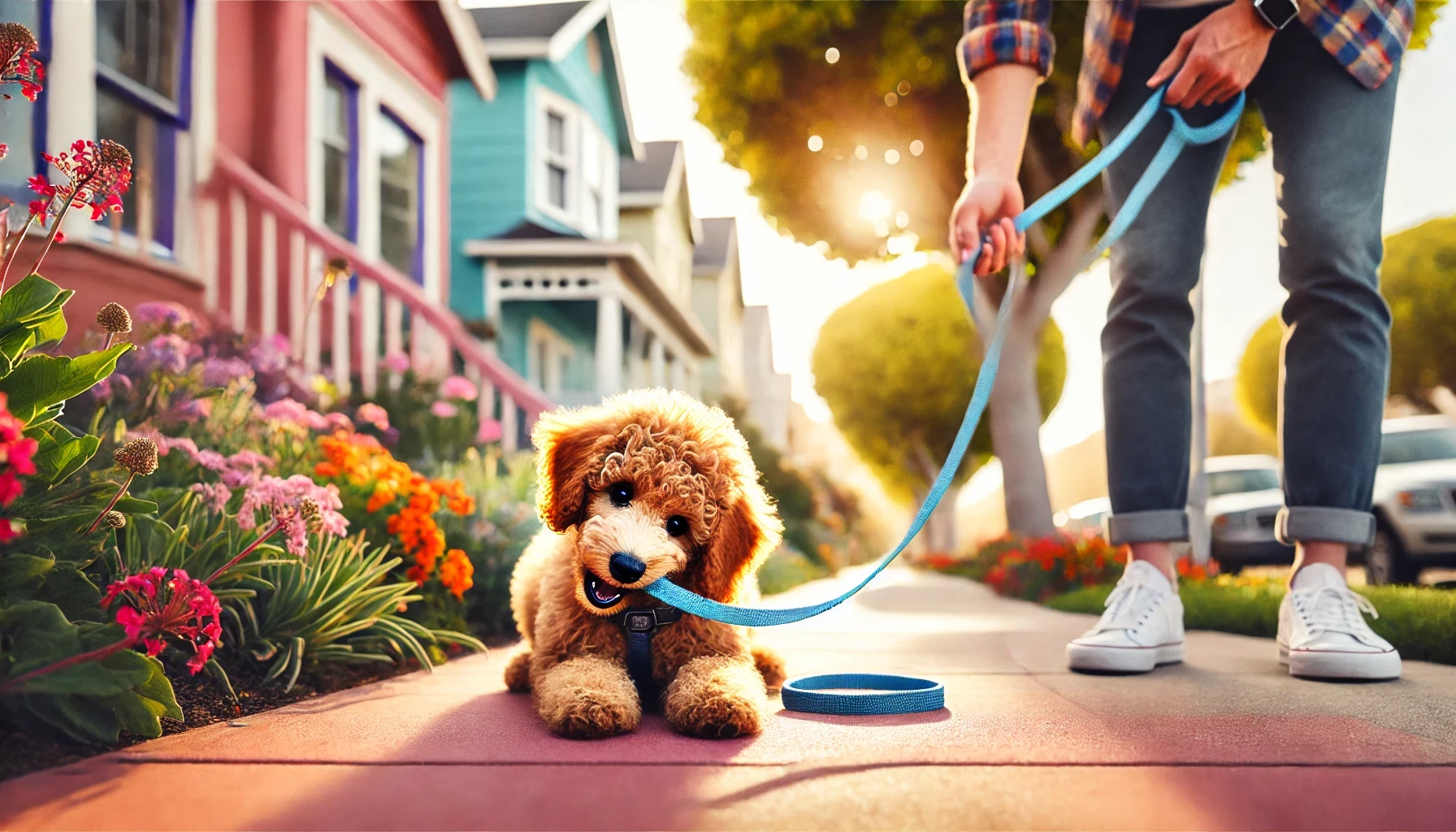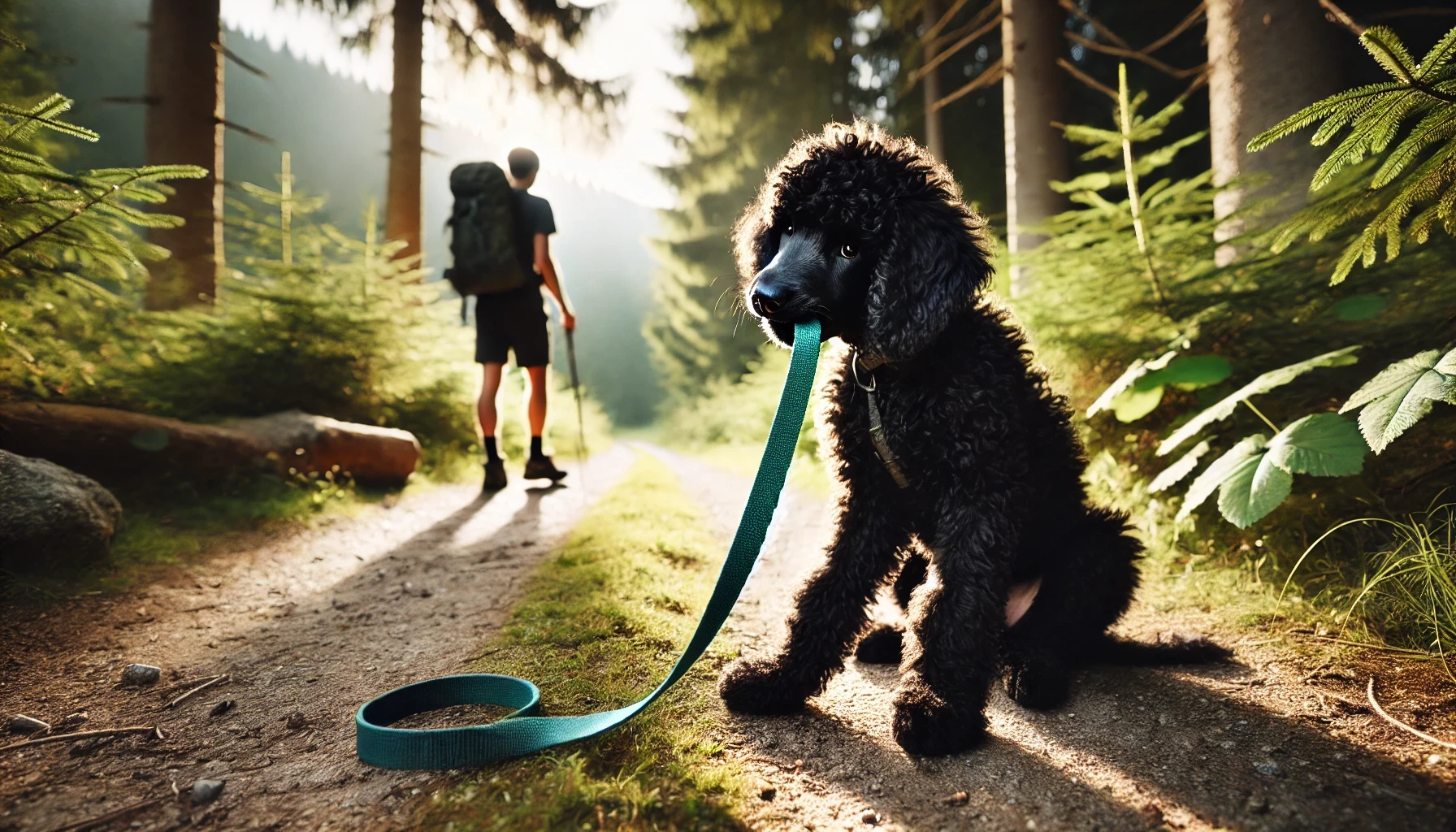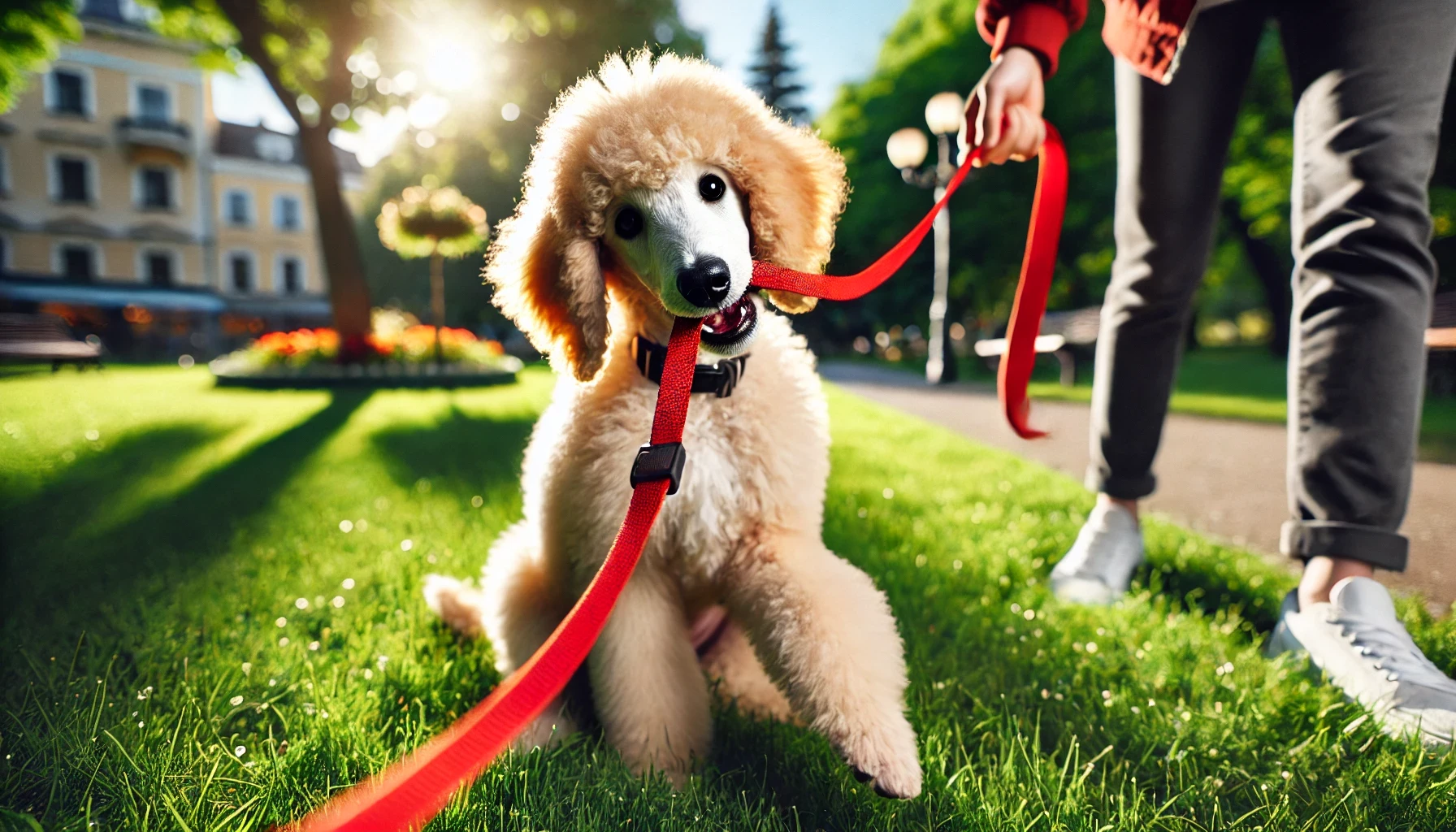On this page
Could Your Standard Poodle’s Leash Chewing Be a Sign of Something Bigger?
Yes, a 7-month-old Standard Poodle chewing on its leash during walks could indicate underlying issues, such as boredom, frustration, or lack of proper training. At this age, Poodles are full of energy and curiosity, and leash chewing may be their way of expressing excitement or seeking attention. While it might seem like harmless puppy behavior, it can become problematic if not addressed early.
Diet may also contribute to this habit. A lack of essential nutrients, such as omega-3 fatty acids or proper protein levels, can lead to heightened irritability or excess energy, exacerbating leash-chewing behavior. Understanding the root causes and implementing corrective measures ensures enjoyable walks for both you and your dog.
Tackle leash-chewing behavior with Dosty’s expert training videos. Download the app now
Why Does Your Standard Poodle Chew on Its Leash?
Is leash chewing a common issue in Standard Poodles? Yes, their intelligence and energy often manifest in behaviors like leash chewing.
Key Reasons for Leash Chewing:
Boredom: Without enough mental or physical stimulation, leash chewing can become a way to pass the time.
Excitement: Overstimulation during walks can lead to biting and pulling at the leash.
Teething: At 7 months, your Poodle may still be teething, seeking relief by chewing on the leash.
Attention-Seeking: If leash chewing gets a reaction from you, it reinforces the behavior.
Dr. Emily Larson explains, “Leash chewing is often a sign of unaddressed energy or excitement in young dogs, especially active breeds like Standard Poodles.”
Prevention Tips:
Exercise your Poodle before walks to reduce excess energy.
Use a chew-proof leash to discourage the behavior.
Provide alternative outlets, such as chew toys, for teething puppies.
Learn how to prevent leash-chewing with Dosty’s behavior guides. Explore now!
Could Training Techniques Help Stop Leash Chewing?
Are training methods effective for correcting leash-chewing behavior? Yes, consistent training is crucial for teaching your Poodle acceptable behavior during walks.
Training Techniques to Try:
Positive Reinforcement: Reward your dog with treats or praise when they stop chewing the leash.
Redirect Attention: Carry a toy or treat to redirect their focus away from the leash.
Teach the “Drop It” Command: Train your Poodle to release the leash on cue.
Structured Walks: Maintain a calm pace and avoid sudden changes that might overstimulate your dog.
Dr. Laura Bennett advises, “Address leash chewing with calm and consistent training to avoid reinforcing unwanted behaviors.”
Why Training Works:
Intelligent breeds like Standard Poodles respond well to clear, positive guidance.
Early correction prevents the behavior from becoming a habit.
Master leash training with Dosty’s step-by-step tools. Join today!

Can Your Poodle’s Leash Chewing Be Related to Teething?
Is your Poodle’s age influencing their behavior? Yes, at 7 months, teething can make leash chewing a natural response to gum discomfort.
Signs of Teething-Related Chewing:
Increased Desire to Chew: Leashes, toys, or household items may all be targeted.
Irritated Gums: Redness or swelling in the mouth area.
Frequent Drooling: A common symptom of teething discomfort.
Dr. Michael Carter explains, “Teething is a temporary phase that often peaks around 6 to 8 months, leading puppies to chew on anything within reach.”
How to Help:
Provide teething-specific chew toys to soothe their gums.
Freeze a wet cloth or use chilled rubber toys for additional relief.
Avoid scolding—redirect their chewing to appropriate items instead.
Does Leash Material Influence Chewing Behavior?
Could the type of leash be encouraging your dog to chew? Yes, the texture and durability of the leash play a role.
Leash Factors to Consider:
Material: Soft or flexible leashes may feel like chew toys to your dog.
Size: A leash that’s too long or too short can create frustration.
Durability: Thin or flimsy leashes are easier to bite and destroy.
Dr. Rebecca Allen suggests, “Opt for a chew-resistant leash made from durable materials like nylon or leather to reduce chewing opportunities.”
Recommended Leashes:
Chew-proof designs with metal reinforcements.
Adjustable lengths to suit your walking style.
Handles with comfortable grips to maintain control during walks.
How Can You Make Walks More Engaging to Prevent Chewing?
Does boredom during walks lead to leash chewing? Yes, under-stimulated dogs often use chewing as a way to entertain themselves.
Ways to Make Walks Engaging:
Interactive Play: Incorporate games like fetch or hide-and-seek during walks.
Scent Work: Encourage your Poodle to sniff and explore safely along the route.
Training Sessions: Practice commands like “heel” or “sit” to keep their focus.
Vary Routes: Changing your walking path adds novelty and excitement.
Dr. Sarah Thompson advises, “An engaging walk keeps your Poodle mentally stimulated, reducing the likelihood of undesirable behaviors like leash chewing.”

Addressing Leash Chewing in Standard Poodles
Leash chewing in a 7-month-old Standard Poodle is often a sign of boredom, excitement, or teething. Addressing this behavior requires a combination of training, proper leash selection, and mental stimulation. By understanding the root causes and implementing these strategies, you can ensure stress-free walks for both you and your dog.
Simplify your walks with Dosty’s expert tools and tips. Download the app now!


